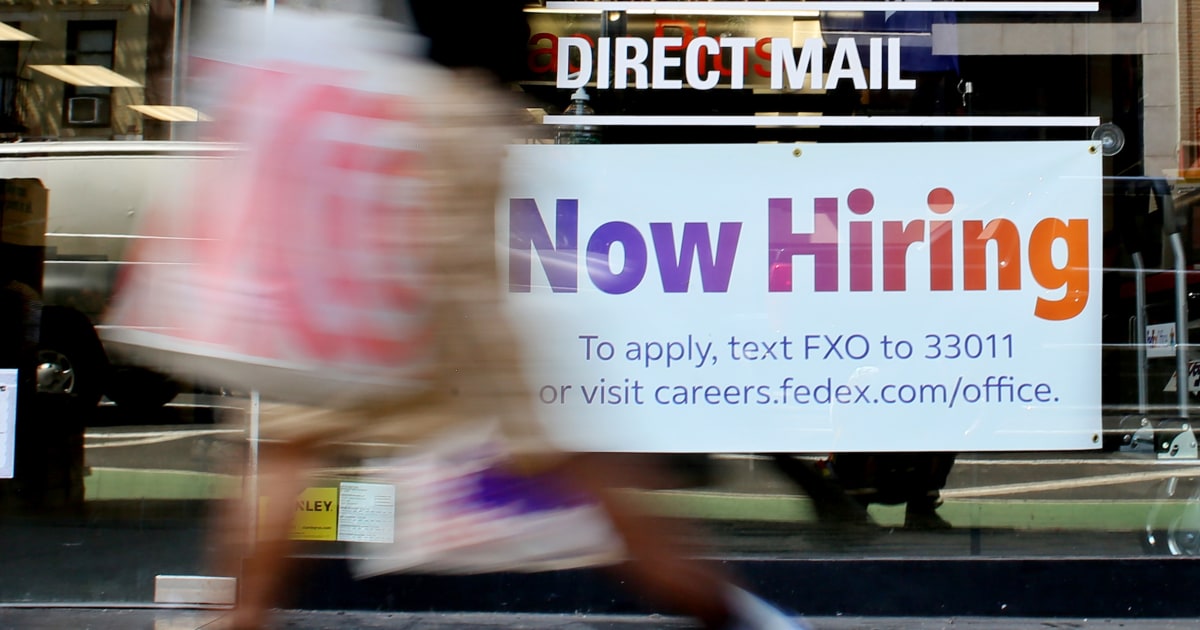By Martha C. White -
NBC News
Almost 4.3 million workers voluntarily left their jobs in August, the Labor Department reported Tuesday, while the number of job offers declined from the all-time highs in recent months.
Job offers fell from a record 10.9 million to 10.4 million, an unexpected drop that, according to experts, could be attributed to the contraction in business activity due to the delta variant of the coronavirus, to the drop in economic expectations, to which companies took a break at the end of the summer to hire, statistical errors or some combination of all of it.
[The House of Representatives votes to temporarily increase the debt ceiling to avoid an economic disaster]
"If we look across broad sections of economic metrics, we know there has been some moderation recently" in economists' expectations, said Mark Hamrick, Bankrate's chief financial analyst.
The International Monetary Fund (IMF) cut its projection for growth of the US gross domestic product for this year by a percentage point, reducing its forecast on Tuesday from 7% to 6%.
“There are still many notable cross-currents in the economy.
It stands to reason that this comes at a cost to employment, ”Hamrick said.
But with more than 10 million unfilled jobs, it is clear that more workers are seeking better working conditions.
The rate of people leaving their jobs reached a record 2.9%, especially in the hospitality and wholesale sectors.
"Considering that employment levels are lower, it's amazing to see thousands of people quit," said Julia Pollak, chief economist at ZipRecruiter.
[The rise in the price of gasoline will make "all corners of the economy more expensive," experts warn]
The desire to avoid jobs with a lot of in-person contact could be driving some of the migration.
“It is interesting to see how widespread this resignation record is.
Maybe part of what is happening is that people are abandoning these face-to-face sectors for others where they have less contact with customers ”, he pointed out.
Are you planning to travel for Christmas?
Expect to find exorbitant flight prices
Oct. 9, 202101: 48
Job vacancies fell to a greater extent in two sectors: health and social assistance, and accommodation and food services, sectors very much affected by the long duration of the pandemic.
Experts warn that the labor shortage is affecting the ability of family businesses to prosper and even, in a growing number of cases, to survive.
[After more than a year of the pandemic, saving is still difficult. This may change soon]
Small business networking platform Alignable found that a third of surveyed restaurant owners doubted they could get through the holidays without breaking the bank.
The inability to hire is a key factor, according to Alignable co-founder and CEO Eric Groves, who cautioned that other types of businesses that rely heavily on labor for revenue, such as personal services and transportation, they face similar risks.
[How does not being vaccinated against COVID-19 impact your pocketbook?]
"If labor is a critical element for income, it is a challenge," he said, pointing to anecdotal reports of family-owned restaurants and stores that have closed their doors completely for most of the week.
A customer leaves a restaurant where employees are being searched in Richardson, Texas, on Sept. 2, 2020.LM Otero / AP
"The problem is that when there is little staff ... you have to give your employees a break to be able to offer the level of service you want," he recalled.
Groves said all kinds of companies have had to raise wages - in addition to paying higher costs for supplies and raw materials - but many had a hard time finding workers.
A new survey by the National Federation of Independent Business (NFIB) revealed that 51% of small businesses - an unprecedented percentage - are unable to fill their jobs.
"This is an incredibly difficult time for those with open positions to find and attract applicants," said Holly Wade, executive director of the NFIB Research Center.
[Women continue to save less than men for retirement. So you can retire with greater peace of mind]
“For many of them, they are not getting any applications - there are just no resumes coming in right now,” he noted, even though a record 42% of small businesses said they have increased pay and 30% said that they plan to do so in the next three months.
Wade said the high turnover of the existing workforce compounds the challenge.
Shortages increasingly weigh on entrepreneurs' future prospects: The NFIB survey found that optimism for small businesses fell and uncertainty for owners increased.
This weighs on growth plans, such as capital investment, according to the survey.
Despite the contraction in job vacancies, the labor shortage remains a cloud hanging over the economic recovery.
“I don't see this problem going away anytime soon.
Small business owners anticipate having to deal with this well into 2022, ”Wade said.








/cloudfront-eu-central-1.images.arcpublishing.com/prisa/KMEYMJKESBAZBE4MRBAM4TGHIQ.jpg)



